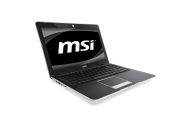Many people consider the Apple MacBook Air to be the gold
standard in ultrathin laptops, but Windows users don't have to jump to the Mac
platform to get the same slim and sleek design.
The seven lightweight laptops here are each no more than
about an inch thick, and in some cases they cost several hundred dollars less
than the groundbreaking Apple laptop.
Here's how these ultrathin laptops each stack up to Apple's
popular 13.3-inch ultraportable (discussed in the order of their announcement).
Samsung Series 9
Advantages: The 13.3-inch Samsung Series 9 comes with
twice the memory (4GB versus 2GB) of the MacBook Air. It also has a backlit keyboard, faster USB 3.0 ports, and, most important, the latest Intel processors (two generations newer than the 2010 MacBook Air). Samsung's
high-style laptop is a touch thinner and lighter than the MacBook Air, too,
though not noticeably so.
Disadvantages: Retailing for $1599, the Series 9
doesn't have any price advantage over the high-end MacBook Air model and costs
$300 more than the lower-end Air version. The MacBook Air also has a higher
display resolution (1440 by 900 pixels) than that of the Series 9 (1366 by 768
pixels).
Note: The Samsung Series 9 also comes in an 11.6-inch
version to rival Apple's similar, smaller MacBook Air.
Toshiba Portege R830
 Advantages: Also
boasting a 13.3-inch display, the Toshiba Portege R830 (starting at $890)
weighs only 0.3 pound more than the MacBook Air, yet can save you as much as
$700. Like the Samsung Series 9, the Portege R830 comes with 4GB of RAM (twice
the memory of the MacBook Air) and USB 3.0 ports. Its rated battery life is 2
hours longer than that of the MacBook Air and the Series 9. Perhaps most
distinctive for a laptop of this size and weight: The Portege R830 comes with 4GB of RAM (twice the memory of the MacBook Air)
and USB 3.0 ports. Its rated battery life is 2 hours longer than that of the
MacBook Air and the Series 9. Perhaps most distinctive for a laptop of this
size and weight: The Portege R830 has an integrated DVD drive.
Advantages: Also
boasting a 13.3-inch display, the Toshiba Portege R830 (starting at $890)
weighs only 0.3 pound more than the MacBook Air, yet can save you as much as
$700. Like the Samsung Series 9, the Portege R830 comes with 4GB of RAM (twice
the memory of the MacBook Air) and USB 3.0 ports. Its rated battery life is 2
hours longer than that of the MacBook Air and the Series 9. Perhaps most
distinctive for a laptop of this size and weight: The Portege R830 comes with 4GB of RAM (twice the memory of the MacBook Air)
and USB 3.0 ports. Its rated battery life is 2 hours longer than that of the
MacBook Air and the Series 9. Perhaps most distinctive for a laptop of this
size and weight: The Portege R830 has an integrated DVD drive.
Disadvantages: Although the Portege R830 has a
larger-capacity drive (640GB), it's a slower 5400-rpm SATA hard drive rather
than the premium Flash storage type found in the MacBook Air. The Portege
R830's display resolution (1366 by 788 pixels) is lower than the MacBook Air's
(1440 by 900 pixels), too. Finally--and most noticeably--while the MacBook Air
is known for its supersleek profile, the Portege R830 has a boxier build and is
about a third of an inch thicker (1.05 inches at its thickest).
MSI X-Slim X370
 Advantages:
If you don't mind a bit more thickness (0.2 inch) and a touch more weight (0.2
pound) to your ultraslim laptop, you can save between $700 and $1000 by buying
the $599 MSI X-Slim X370 instead of the MacBook Air. This 13.4-inch machine
should have a longer battery life than the MacBook Air (up to 3 hours more than
the Air's 7 hours), thanks to its new AMD Fusion processor. It comes with 4GB
of memory instead of 2GB, and it has an HDMI port for connecting to your TV.
Advantages:
If you don't mind a bit more thickness (0.2 inch) and a touch more weight (0.2
pound) to your ultraslim laptop, you can save between $700 and $1000 by buying
the $599 MSI X-Slim X370 instead of the MacBook Air. This 13.4-inch machine
should have a longer battery life than the MacBook Air (up to 3 hours more than
the Air's 7 hours), thanks to its new AMD Fusion processor. It comes with 4GB
of memory instead of 2GB, and it has an HDMI port for connecting to your TV.
Disadvantages: Though undoubtedly thin, in terms of design
the X-Slim X370 isn't as cutting-edge as the MacBook Air and its aluminum
unibody construction. And although the 500GB hard drive available for the X370
at retail has a faster (7200-rpm) speed than MSI previously announced, it's not
the high-performing Flash storage that the MacBook Air offers. Finally, Apple
has better brand recognition than MSI, which may or may not matter to you.

No comments:
Post a Comment